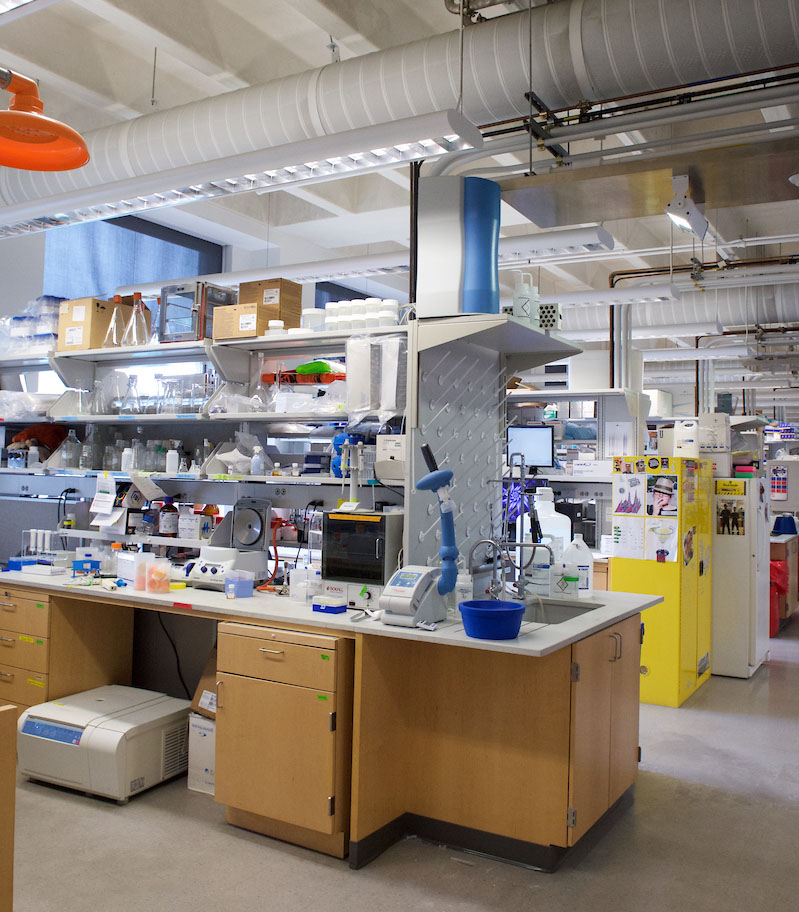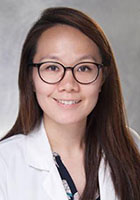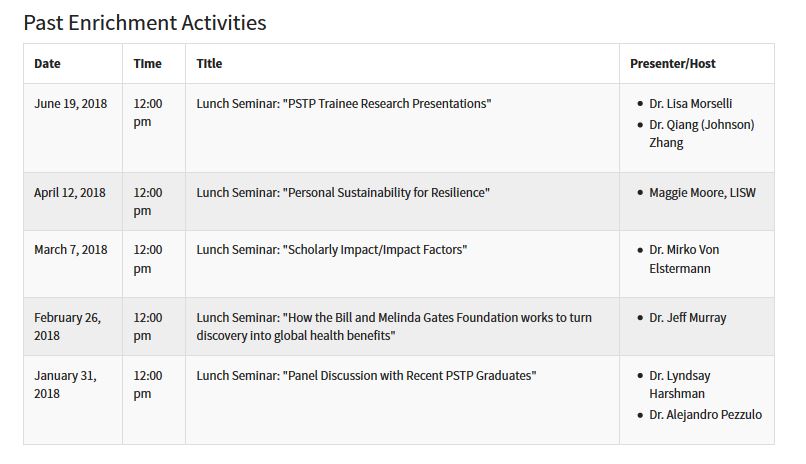 After more than a dozen years, Joel Kline, MD, will step down as Director of the Physician Scientist Training Pathway (PSTP) at the University of Iowa in a few weeks. David Stoltz, MD, PhD, Associate Program Director of the PSTP, will switch roles with Dr. Kline and take over as Director. Both are Professors of Internal Medicine in the Division of Pulmonary, Critical Care, and Occupational Medicine. Dr. Kline, also a Professor of Occupational and Environmental Health, will continue in his roles as Vice Chair for Clinical Strategy for the Department of Internal Medicine and Associate Chief of Staff for Education at the VA Medical Center, while Dr. Stoltz, who is also a Professor of Biomedical Engineering and of Molecular Physiology and Biophysics, will continue to direct research into cystic fibrosis in his lab.
After more than a dozen years, Joel Kline, MD, will step down as Director of the Physician Scientist Training Pathway (PSTP) at the University of Iowa in a few weeks. David Stoltz, MD, PhD, Associate Program Director of the PSTP, will switch roles with Dr. Kline and take over as Director. Both are Professors of Internal Medicine in the Division of Pulmonary, Critical Care, and Occupational Medicine. Dr. Kline, also a Professor of Occupational and Environmental Health, will continue in his roles as Vice Chair for Clinical Strategy for the Department of Internal Medicine and Associate Chief of Staff for Education at the VA Medical Center, while Dr. Stoltz, who is also a Professor of Biomedical Engineering and of Molecular Physiology and Biophysics, will continue to direct research into cystic fibrosis in his lab.
Given this time of transition in the PSTP, it is worthwhile to review the accomplishments of this unique program. Under Dr. Kline’s leadership, the PSTP has grown from five trainees to more than 25; likewise, although Internal Medicine has always accounted for the greatest number of residents and fellows, the PSTP has served as an important training resource for departments across the Carver College of Medicine. We recently sat down with Dr. Kline, Dr. Stoltz, and several participants in the PSTP for a series of conversations about its purpose, its successes at Iowa, and what’s next for the program.
A fast-track to the lab
Generally, PSTPs offer applicants who know they want to focus solely on a research career in academic medicine the opportunity to drop one year of clinical work in their residency and a guaranteed spot in a subspecialty fellowship afterward. Originally, accrediting organizations like the American Board of Internal Medicine (ABIM) offered “short-tracking,” where people could eliminate a year of residency entirely and move right into fellowship. This ended with a more formal creation of a research pathway; subtracting time from clinical training, but adding it back under mentored research training. Although this does not shorten the overall training time, it does allow for trainees to spend that time preparing more deeply for their chosen career paths.
 PSTP members enter the program with considerable research experience. Most, but not all, enter the program after they finish a Medical Scientist Training Program (MSTP), which leads to a combined MD-PhD degree, a lengthy process. Others have gained research expertise through a Master’s degree or one of the programs that promotes research for medical students, such as the Howard Hughes Medical Institute, the Doris Duke Foundation, or the National Institutes of Health (NIH). Given the additional time that these students have devoted to preparing for a career as a research scientist, the ability to concentrate on enhancing research skills and productivity in a PSTP during their training period is an attractive opportunity.
PSTP members enter the program with considerable research experience. Most, but not all, enter the program after they finish a Medical Scientist Training Program (MSTP), which leads to a combined MD-PhD degree, a lengthy process. Others have gained research expertise through a Master’s degree or one of the programs that promotes research for medical students, such as the Howard Hughes Medical Institute, the Doris Duke Foundation, or the National Institutes of Health (NIH). Given the additional time that these students have devoted to preparing for a career as a research scientist, the ability to concentrate on enhancing research skills and productivity in a PSTP during their training period is an attractive opportunity.
A multi-disciplinary and collaborative structure
From the beginning, Dr. Kline explained, the Iowa PSTP took individuals with “sustained interest in research and effective performance” and began thinking of them as potential faculty. Establishing this “pipeline” could potentially reduce effort in recruitment but could also ensure that a portion of junior faculty joining Iowa would have received training that would ease their transition and enhance their future success.
And although nominally, the PSTP was organized originally to include trainees from the Departments of Internal Medicine, Pediatrics, and Pathology, almost all the early members were from Internal Medicine when Dr. Kline assumed the directorship. “Since then we’ve developed the program to include a lot more specialty programs. We’ve had trainees in radiation oncology, dermatology, neurology, psychiatry, OB/GYN, and a number of other specialties.”
This has a number of benefits both for the students and the institution. Dr. John Buatti, DEO and Chair of the Department of Radiation Oncology, values the exposure PSTP residents in his department get to other disciplines. “Developing a network of peers is really important,” Dr. Buatti said. “It can be an effective recruitment tool for their residency program. I always tell prospective residents about it in the interviews. ‘You’ll have an established network of people you can work with.’ Really unique for us.”
Dr. Kline agrees that Iowa’s PSTP aids in resident recruitment as an option for prospective candidates. Internal Medicine Residency Director Dr. Manish Suneja also finds value in the PSTP when talking with residency applicants about their potential career paths. “This program is definitely an asset,” Dr. Suneja said. Working with a broad spectrum of scientists offers PSTP members the opportunity to participate in robust research activities. Dr. Kline said, “Most research publications of physician-scientists are not singly authored. Our trainees are learning from the very beginning that their peers are doing very different and very interesting things. We hope that this leads to them being better interdisciplinary citizens.”
The Iowa difference
One of the chief distinguishing characteristics of the Iowa PSTP, though, is its adaptability to each individual. Though many take advantage of the opportunity to reduce the time in residency spent in clinical training, this reduction is not required. Because there will be clinical expectations once they reach their fellowship, PSTPs are encouraged to gain those skills when it best suits them. Whichever they choose, Dr. Kline advises trainees, “ten years from now, they’re going to be just as good a subspecialist.”
 Dr. Christine Cho is a graduate of the PSTP program and now an Associate in the Division of Infectious Diseases (ID). She chose to do all three years of the typical residency in Internal Medicine; she wanted to have as broad an information base as possible before entering the ID fellowship. “ID is not just one organ system,” Dr. Cho said. “I met other fellows and they really knew their stuff.” Mentors both within the PSTP and within ID were encouraging. Dr. Cho is grateful for the advice from Dr. Kline and Dr. Bill Nauseef, among others.
Dr. Christine Cho is a graduate of the PSTP program and now an Associate in the Division of Infectious Diseases (ID). She chose to do all three years of the typical residency in Internal Medicine; she wanted to have as broad an information base as possible before entering the ID fellowship. “ID is not just one organ system,” Dr. Cho said. “I met other fellows and they really knew their stuff.” Mentors both within the PSTP and within ID were encouraging. Dr. Cho is grateful for the advice from Dr. Kline and Dr. Bill Nauseef, among others.
 Another PSTP grad, Dr. Alejandro Pezzulo, is grateful for the Iowa difference, as well. Dr. Pezzulo, an Assistant Professor in Pulmonary, Critical Care, and Occupational Medicine, knew before entering the program that it offered flexibility. “Very few places match Iowa at supporting junior faculty carving their own niche.” And once he was in the program, Dr. Pezzulo carved his niche, under the mentorship of Division Director Dr. Joseph Zabner, into a Parker B. Francis Fellowship in Pulmonary Research.
Another PSTP grad, Dr. Alejandro Pezzulo, is grateful for the Iowa difference, as well. Dr. Pezzulo, an Assistant Professor in Pulmonary, Critical Care, and Occupational Medicine, knew before entering the program that it offered flexibility. “Very few places match Iowa at supporting junior faculty carving their own niche.” And once he was in the program, Dr. Pezzulo carved his niche, under the mentorship of Division Director Dr. Joseph Zabner, into a Parker B. Francis Fellowship in Pulmonary Research.
Future of the program
Some programs, Dr. Kline pointed out, call themselves PSTP but fall short of what Iowa offers. “[These other places] offer admission into a research pathway, but essentially they’ll recruit someone and say, ‘You’re now a PSTP.’ Seven years later, they shake your hand and say ‘Thanks for coming through the PSTP program.’ In contrast, we have a vibrant monthly seminar, quarterly social events, career development and mentoring activities, and a formal curriculum.”
In gauging the successes of his tenure as Director, Dr. Kline shares that it probably is too soon to tell, although the available metrics are promising. “Our trainees and alumni are publishing in excellent journals; we have graduates who are faculty members; we have graduates who are getting career development awards. We have a few graduates who have gotten R01 or program project grants and who have been awarded tenure. But we really need to know—10, 20 years later—are they truly leaders as physician scientists? These are not short-term outcomes.”
Dr. Stoltz, who has been working as the Associate Director for five years alongside Dr. Kline, intends to carry on the traditions that Dr. Kline established. “Dr. Kline has provided outstanding leadership for this program that has become a model PSTP for others in the country to follow. I look forward to building upon these successes.”
Whatever adjustments are next for the PSTP, its fundamental purpose will remain a cornerstone of the Carver College of Medicine’s offerings and the future of its faculty as well. “If research is in your future,” Dr. Pezzulo said, “a PSTP jumpstarts the transition toward a faculty position. Choosing a program can be difficult. I’ve learned that a good way to choose an institution is by looking at how they treat their junior faculty, and Iowa excels at it.”

One comment on “Iowa’s PSTP Offers Trainees Rigor and Specialization”